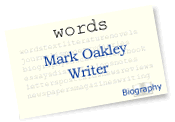

|
| Faith is a collage, words are a key |
| Poetry is faith |
| The light in the shadow of the divine |
Poetry is faith
So for me to explore faith is to explore the exploration. And because of understandable time limits, I have decided just to focus briefly on the importance of poetry to faith. Novels, and I do have to say films too, can be vital for exploring the nature of reality and for developing the imagination to begin to understand what it must be like to be someone else. That, of course, is always a major spiritual shift for any person. Spiritual, because selfish talk about the self weakens. To learn how to empathise, and then to see how someone else's muddle relates to your own, is to start the journey into the large questions we all face, the ones we all live with and die with. It is to learn how they are met by other people from us in other places and in other times. To search further on this quest is to start learning, I believe, the languages of faith and the human spirit. For this reason I tend to agree with Kafka when he wrote in one of his letters to Oscar Pollack, "I think we ought to read only the kind of books that wound and stab us. We need the books that affect us like a disaster. A book must be the awe for the frozen sea inside us." Novels are able both to demythologise us and to re-mythologise us. And after last night** you might like to know the definition of a politician as one who, when he sees light at the end of a tunnel, orders more tunnel.
Well, spiritually that might be valid. But what of poetry? Because of my thoughts on the nature of faith I believe that poetry is the natural language, the grammar of faith. Faith's heartland is prayer and it's when people of faith pray that we see the poetry taking shape. Not only can we hear the poetry, but we become part of it in poetic ritual. By this I mean that we acknowledge that truth isn't the same thing as eliminating ambiguity, and that the words and gestures of faith are multi-layered in meaning. Multivalence and overlaying doesn't reduce the resonance of this language - quite the contrary - it forges an authority. It's when liturgical language tries to reduce itself and take on the form of a factual print, as you might find in a menu, that it makes the soul feel very let down. The fixity of the letter must have the flame of the spirit. Here is Gail Ramshall's account of the poetic liturgy of Easter, for instance:
'Think of the "Exsultet". Here, in the middle of the dark night, a single burning candle is lauded as the greatest light the world has seen. Rather than talk about Christ and the Resurrection, the chant sings about light and the night. The light is the splendour of the Eternal King and it shines brightly throughout the world, enrobing the Church in its fire. The candle is an icon before us, becoming other than it is, receiving us other than we are as the chant transforms words into other than they appear. In perhaps the most dizzy collage of images, the morning star arises from the grave to find one single candle burning, vanquishing night and itself becoming a beacon of light. Where our recently purchased Pascal candle stops, and where Christ takes over, it is impossible to say.'
So to explore the faith of a community will mean encountering the ritual poetry of its movement, ritual, gesture, movement, dancing with words, sound and colour. To explore faith only in a text book and not to visit it in its natural home of prayer and daily life would be like examining a corpse. It may well be that an age of information may need to be helped to use a language that is figurative and not factually descriptive; faith will only, I believe, be able to breathe if the figurative, symbolic and metaphorical are allowed freedom to move and exercise. Faith language refers, but cannot describe like the internet. Faith language involves intimation more than specification for it is a language of love and longing. Imaginative and varied utilisation of words does not detract from God, as if the imagination was some vestigial organ, like the appendix; it awakens us to the possibilities of significance, epiphany, "a momentary stay against confusion" in the words of Robert Frost. These words keep the rumour of God alive.
** A General Election
was held on 7th June 2001